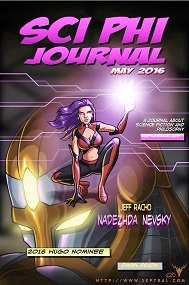 Sci Phi Journal #13, May 2016
Sci Phi Journal #13, May 2016
“Immortality Serum” by Michaele Jordan
Reviewed by Herbert M. Shaw
“Immortality Serum” by Michaele Jordan
A high-statured woman entertains the extraordinary idea of life everlasting with a subject of her prince’s. In the first story of Hugo Award nominated Sci Phi Journal, author Jordan gives thought to the concept of immortality and how it should be approached from a scientific standpoint. The interaction of the three characters is short, sweet, and light-hearted fun that paints a curious picture of how courtesy can help reveal the truth.
“Nadezhda Nevsky” by Jeff Racho
Virtual play experiences a new reality when it is merged with the subliminal world of massively multiplayer online role playing games. In this story, an eager developer decides to create a sidekick character for an online game, and is surprised when it begins to learn on its own. Coincidentally, this occurs during a joint venture with a doctor interested in researching a cure for mental illness. Racho’s way of developing the title sidekick (a name that translates to “hope” in the story) enthralls the reader more in her personality than in the progression of the story, but still creates a look at the world through an advanced technological eye.
“Bre” by Eric B. Scott
What if a manufactured lifeform became self-aware before it experienced life? That’s the question answered in Scott’s flash-fiction piece about a scientist whose perfect mate quickly realizes that, much to his chagrin, she has choices as a human life form. But are clones really as free as natural born humans? This story quickly moves from proud to amorous to anxious and back as the reader is left to wonder where the cycle ends.
“Invasion of the Common Sense Aliens” by T. D. Edge
A being from space judges your actions and tells you how to live your life. Sound familiar? A group of aliens question all that humans believe in a longer story about what makes the most “sense,” depending on whose definition of the word is being used. The meaningness of all positions in life from professional to political are questioned by the cordially conversational invaders. Of the philosophies presented in this issue of the Journal, Edge’s story creates a new deity for humans to worship and obey—our own discernment to do the right thing.
“Gray Wind” by Eric T. Reynolds
Following an apocalyptic event, a lone humanoid machine fights to preserve what it knows as the last sentient being “alive.” Reynolds explores what can only be described as the emotions of an android whose sense of duty overrides what might be the natural survival instinct of any surviving human being. When the resolution is delivered, the reader has had such a journey that it’s hard to remember how grim the situation is.
“The Berlin Doctrine” by Anton Rose
Can Hitler even be killed? Of all the stories in this issue of Sci Phi Journal, Rose’s race through time to take out the inevitable Chancellor and Führer of Germany is the most enthralling. Though time travel has seen many forms over the years in print and film, not many stories aside from 1995’s Twelve Monkeys comes close to the goal of The Berlin Doctrine, the name given to the project sending mercenaries back in time to murder Hitler (who is never referred to by name, aside from a shortened version in his formative years). With comedic errors and lapses in judgment here and there, Rose’s story proves that despite history’s rewrites, its changes are not so easily transcribed.
“Unalienable Right” by Leenna Naidoo
This small number places the aliens as talking kangaroos who determine the ownership of newly discovered minerals. Despite a quick and easy story that could amount to a late night sketch, this one could potentially have led to a much greater story that explores beyond the title rights when celebrating an achievement.
“Tiangong Park” by Erika D. Price
Following planetary destabilization, Price delivers an extensive diatribe about adjusting to life in the future. With concepts explored such as survival of the species after Earth, and permanent consciousness straight out of a Spike Jonze movie, “Tiangong Park” represents a widely considered possibility for the solution to many of modern day Man’s concerns. The personality traits of the characters are what builds Price’s novelette to its peak before an all too abrupt conclusion.
“An Innocent Choice” by Matthew A. Stirnaman
Funny that the story at the end would be about…the end. The protagonist is faced with the decision of transferring her life to a cancer-free body donor, exploring the promise of existence after death and the doubt of its follower. Another familiar concept in philosophy that is, forgive the pun, brought to life on page by Stirnaman in a way no gospel or scripture ever could. Though short on words, it is made up in true feeling as the main character’s feelings are churned, ground, and ultimately poured out as Sci Phi Journal closes its May issue.